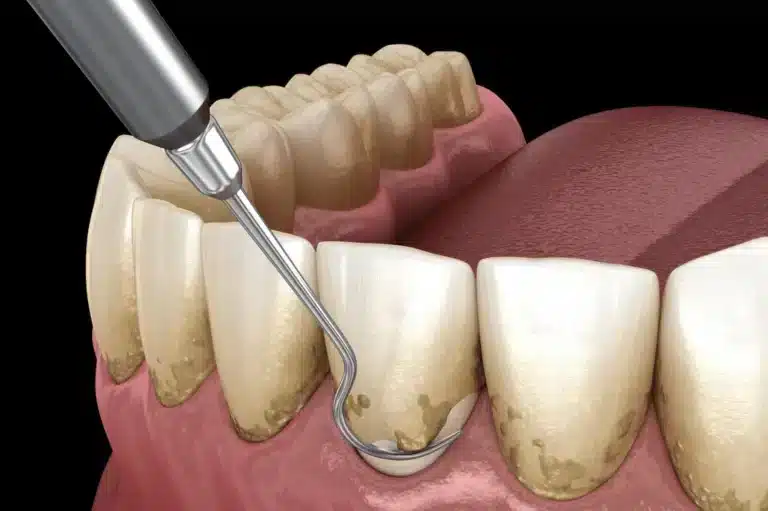Wonder if your poor oral hygiene can lead to gingivitis? Bacteria buildup on teeth can lead to severe gum diseases. Learn more about gingivitis and how you can treat it.
Gingivitis
Gingivitis is the first stage of gum disease. It happens when your teeth get covered in stuff like plaque, tartar, and bacteria, which makes your gums red, puffy, and likely to bleed.
You can take care of gingivitis with your dentist’s help. But if you don’t, it can turn into a worse kind of gum disease called periodontitis, where you start losing the bone in your jaw.
Who Gets Gingivitis
Gum disease is more common in:
- People who were assigned male at birth (AMAB), but scientists don’t know exactly why. It might be related to hormones or that men tend to get certain other diseases more often.
- People who smoke because smoking makes it harder for your body to fight off infections.
Symptoms
Gingivitis can happen without clear signs at first. But as it gets worse, you might notice:
- Bad breath that stays even after you brush your teeth.
- Gums bleed easily, especially when you brush.
- Gums look red and swollen.
- Feeling sensitivity when you eat hot or cold foods.
- Have pain or discomfort when you chew.
Causes
Gingivitis happens because your body reacts to the plaque and tartar on your teeth. When these sticky things stay on your teeth for too long, your gums get irritated, red, and puffy.
You might be more likely to get gingivitis if:
- You’re pregnant or going through hormonal changes linked to oral health.
- You need to take better care of your teeth, or if your teeth are crooked and hard to clean.
- You have diabetes.
- There’s a history of gum problems in your family.
- You smoke or use chewing tobacco.
Also, some medicines, like those for epilepsy, specific cancer treatments, blood pressure meds called calcium channel blockers, and even birth control pills, can make your mouth dry by reducing saliva. Spit helps keep your mouth clean, so this dryness can make gingivitis worse.
Diagnosis
If you think you have gingivitis, visiting a dentist for a checkup is a good idea. During this visit, your dentist will:
- Look for any bleeding in your mouth.
- Check if there are signs of infection, like redness and swelling.
- Examine if your teeth are loose.
- See if your gums are moving away from your teeth, called gum recession.
If your dentist thinks you have gum disease, they might take pictures of your teeth and jaw using X-rays. Sometimes, they might send you to a gum disease specialist called a periodontist for more help.
Treatment
To treat gingivitis and get your gums and teeth healthy again, your dentist or gum specialist will do a few things:
Scaling and Root Planing
They’ll clean your teeth well to get rid of harmful bacteria, plaque, and tartar. Sometimes, they do a deeper cleaning called scaling and root planing. Scaling removes tartar and bacteria from below your gums, and planing smooths your teeth roots to stop bacteria from sticking.

Oral Hygiene
You’ll learn to keep your teeth clean at home and schedule regular checkups to ensure everything’s okay.
Anti-microbial Mouthwash
Using a special mouthwash can also help kill bacteria that cause disease.
Dental Restoration
Your dentist might fix or remove things like crowns, fillings, or bridges if they don’t fit well. Smoother surfaces are easier to keep clean.
Prevention
You can lower your chances of getting gingivitis by taking good care of your mouth:
- Brush your teeth well twice daily. Once in the morning and once before bed.
- If you have diabetes, make sure to manage it properly.
- Don’t smoke or use tobacco products.
- Use floss every day to get rid of bacteria between your teeth.
- Avoid having too many foods and drinks with lots of alcohol or sugar.
- Visit a dentist at least once a year for checkups. If you have any problems, you should go more often.

If gum disease runs in your family, you might be at a higher risk. In that case, talk to your dentist about how often you should get cleanings to keep gum disease away.
Conclusion
Gingivitis, if not treated on time, can cause severe oral infections. Always consult your dentist to improve your oral hygiene habits. Contact Dentalsway for more information on oral health tips to maintain a healthy smile.


